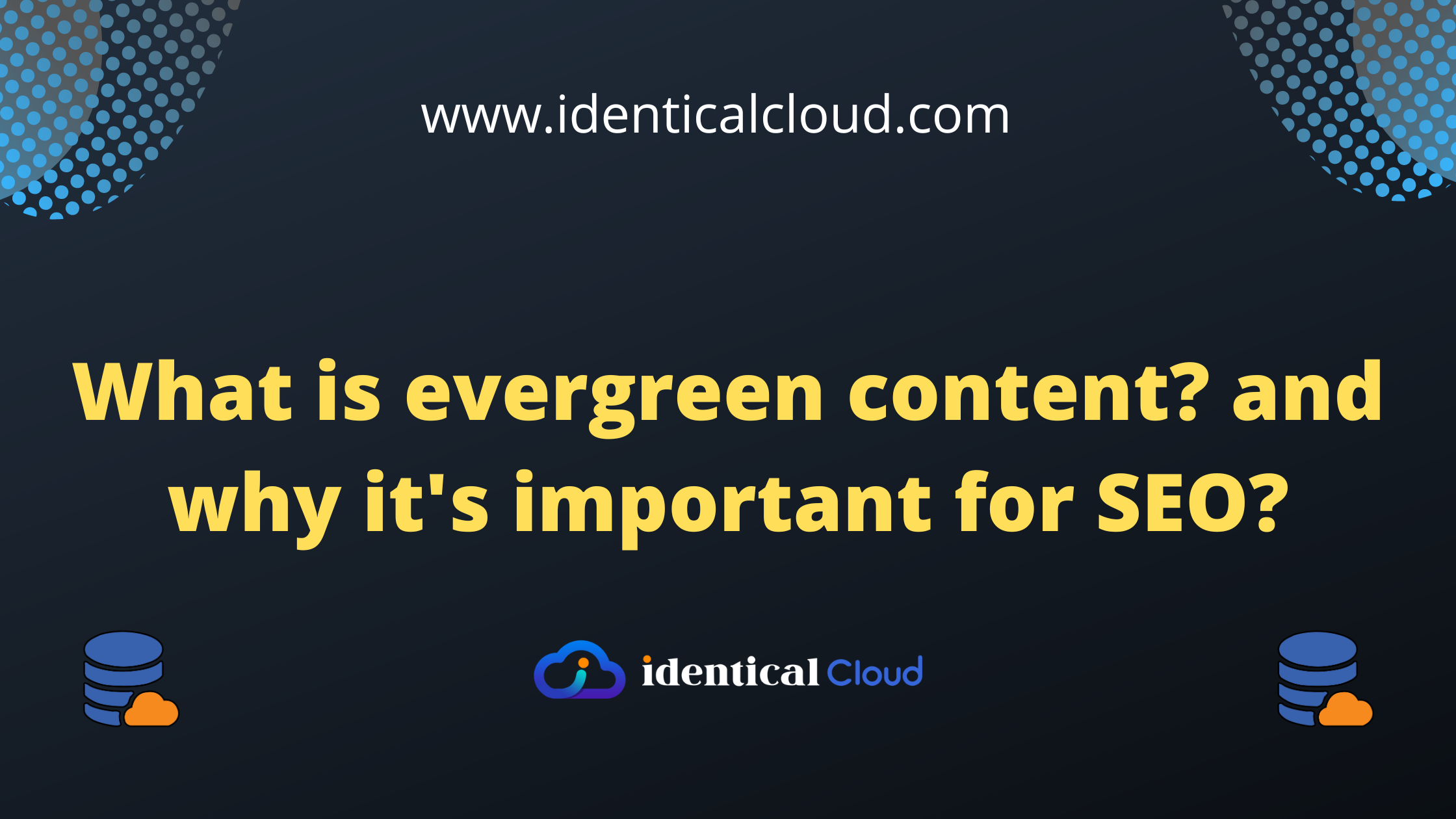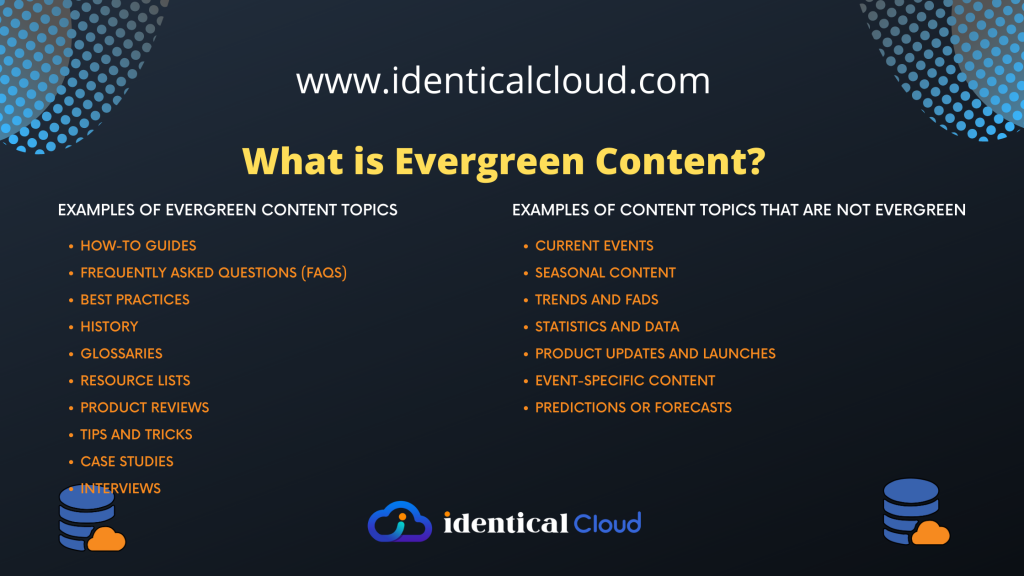
What is evergreen content and why it’s important for SEO
Evergreen Content: The Long-Term Investment for SEO Success
In the world of SEO, content is king. But not all content is created equal. While some web pages become outdated soon after publication, others continue to provide value to readers for years to come. This type of content is called “evergreen content,” and it’s a critical component of any successful SEO strategy.
What is Evergreen Content?
Evergreen content refers to web content that remains relevant and valuable to readers over an extended period, often for years or even indefinitely. Unlike news articles or other time-sensitive content, evergreen content does not become outdated quickly and provides long-term value to the audience.
Examples of evergreen content include how-to guides, frequently asked questions (FAQs), tutorials, best practices, and other resources that offer solutions to persistent problems or provide ongoing value to users. For instance, a guide to choosing the right running shoes or a tutorial on how to use Photoshop are examples of evergreen content.
Why is Evergreen Content Important for SEO?
Evergreen content is important for SEO because it can drive traffic to a website over an extended period, making it a valuable long-term investment. Search engines prioritize high-quality, valuable content that provides long-term value to readers. Therefore, creating evergreen content that answers common questions or addresses persistent problems can help improve a website’s search engine rankings and attract organic traffic over time.
One of the primary benefits of evergreen content is its longevity. Unlike news articles or other time-sensitive content, evergreen content can continue to attract traffic for years after its initial publication. This means that the time and resources invested in creating evergreen content can provide a significant return on investment over time.
Evergreen content can serve as a foundation for other types of content, such as blog posts or social media updates. For example, a how-to guide on a particular topic could inspire a series of related blog posts or social media updates, creating a cohesive content strategy that provides ongoing value to the audience.
Another advantage of evergreen content is its potential to attract backlinks. When other websites link to your evergreen content, it can help improve your website’s domain authority, which is a key ranking factor for search engines. The more high-quality backlinks your website has, the more likely it is to rank higher in search engine results pages (SERPs).

Creating Evergreen Content: Best Practices
Creating evergreen content requires careful planning and attention to detail. To create effective evergreen content, consider the following best practices:
- Choose a topic that has long-term relevance and value to your audience.
- Conduct thorough research and provide detailed, accurate information.
- Organize your content in a logical and easy-to-follow format, such as a step-by-step guide or list.
- Use clear, concise language and avoid jargon or technical terms that may be unfamiliar to your audience.
- Include visuals, such as images or videos, to help illustrate your points and make your content more engaging.
- Optimize your content for search engines by including relevant keywords in the title, headings, and body of the content.
- Update your evergreen content regularly to ensure it remains accurate and up-to-date.
Examples of evergreen content topics
There are many examples of evergreen content topics that can provide long-term value to readers.
- How-to guides: Tutorials that explain how to do something step-by-step, such as how to make pizza, how to write a resume, or how to paint a room.
- Frequently asked questions (FAQs): A list of questions and answers that address common inquiries about a particular topic, such as a product or service.
- Best practices: Tips and recommendations for doing something more effectively or efficiently, such as best practices for social media marketing or best practices for email communication.
- History: An overview of the history of a particular topic, such as the history of the internet, the history of a particular industry, or the history of a specific product or service.
- Glossaries: Lists of terms and definitions related to a particular topic, such as a glossary of marketing terms or a glossary of medical terminology.
- Resource lists: Curated lists of resources, such as blogs, podcasts, or books, that provide value to readers interested in a particular topic.
- Product reviews: Reviews of products or services that provide value to readers looking to make informed purchasing decisions, such as reviews of smartphones, laptops, or cameras.
- Tips and tricks: Short, actionable tips and tricks that provide value to readers interested in a particular topic, such as productivity tips, travel tips, or cooking tips.
- Case studies: Detailed examinations of successful strategies or approaches to a particular problem or challenge, such as case studies of successful startups or case studies of successful marketing campaigns.
- Interviews: Q&A interviews with experts or industry leaders that provide insights and perspectives on a particular topic, such as interviews with successful entrepreneurs or interviews with leading academics in a particular field.
Examples of content topics that are not evergreen
While evergreen content provides long-term value to readers, some content topics may become outdated or irrelevant over time. Here are some examples of content topics that are not evergreen:
- Current events: News articles or stories about current events or trends are not evergreen since they lose relevance quickly as new events unfold.
- Seasonal content: Content that is relevant only during a particular season or holiday, such as articles about Halloween or Christmas, is not evergreen.
- Trends and fads: Content about current trends or fads, such as articles about the latest fashion or technology trends, can become outdated quickly.
- Statistics and data: Content that relies heavily on statistics or data can become outdated quickly as new data becomes available.
- Product updates and launches: Content about specific product updates or launches is not evergreen since it becomes outdated once a new version of the product is released.
- Event-specific content: Content related to specific events, such as conferences or trade shows, is not evergreen since it loses relevance once the event is over.
- Predictions or forecasts: Content that makes predictions or forecasts about the future can become outdated quickly as events unfold differently than expected.
Why evergreen content boosts SEO
Evergreen content can boost SEO in several ways. First, evergreen content tends to be more valuable and relevant to readers over time, meaning that it is more likely to be shared and linked to by other websites, which can increase its search engine rankings. Evergreen content is also more likely to generate ongoing traffic to a website, as it remains relevant to readers even as new content is created.
Evergreen content can boost SEO is by providing a strong foundation of content that can support more targeted or specific content. For example, a website that has a strong library of evergreen content about a particular topic, such as fitness or cooking, is more likely to rank well for more specific keywords related to that topic.
Evergreen content can help to establish a website as an authority on a particular topic, which can improve its overall search engine rankings. When a website consistently produces high-quality evergreen content about a particular topic, search engines may view it as an expert in that area and prioritize it in search results.
Evergreen content is an important part of an effective SEO strategy because it provides ongoing value to readers and can help to establish a website’s authority and relevance to search engines over time.
Evergreen content is a critical component of any successful SEO strategy. By providing long-term value to readers and attracting organic traffic over time, evergreen content can help improve a website’s search engine rankings and drive traffic to the site. Creating effective evergreen content requires careful planning and attention to detail, but the time and resources invested in this type of content can provide a significant return on investment over time.
